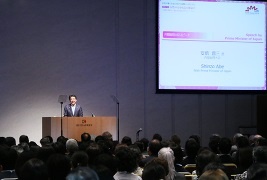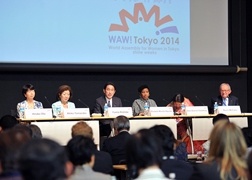|
A Society in which Women Can Shine (No.2)
20th October 2014
 To build a “society in which women can shine” is one of the main pillars of Abenomics. If a society fully utilises women’ potential which has not been utilised enough until now, it will, of course, make economic growth and will also be a boost to society as a whole. After all, half of the people are women. To build a “society in which women can shine” is one of the main pillars of Abenomics. If a society fully utilises women’ potential which has not been utilised enough until now, it will, of course, make economic growth and will also be a boost to society as a whole. After all, half of the people are women.
An international symposium for empowerment of women in society: the “World Assembly for Women in Tokyo” (WAW!) was held in Tokyo from 12 to 13 September with these exact issues in mind. Top leaders who are active in the field of women from the world, such as Christine Lagarde, Managing Director of the IMF, and those from all over Japan participated in the symposium.
 Mari Skåre, NATO Secretary General's Special Representative for Women Peace and Security was also present at the meeting. Two years ago, Ms Skåre was the first person to assume this newly created post. An idea of “NATO and women” is something new, but I was told that it was first recognized in NATO 7 year ago, 5 years before she was appointed, and that it is necessary to have the operational plans and training that reflects the measures to protect women and children, who are in a weak position during conflict. This spring, as a partner, Japan has participated in the process of elaborating on such policies. Mari Skåre, NATO Secretary General's Special Representative for Women Peace and Security was also present at the meeting. Two years ago, Ms Skåre was the first person to assume this newly created post. An idea of “NATO and women” is something new, but I was told that it was first recognized in NATO 7 year ago, 5 years before she was appointed, and that it is necessary to have the operational plans and training that reflects the measures to protect women and children, who are in a weak position during conflict. This spring, as a partner, Japan has participated in the process of elaborating on such policies.
 Following this, a female Japan Self Defense Force officer will be dispatched to NATO HQ by the end of this year. I believe this will certainly be a significant contribution to the operations of NATO. Expect this to be published on the Embassy’s website when it happens! Following this, a female Japan Self Defense Force officer will be dispatched to NATO HQ by the end of this year. I believe this will certainly be a significant contribution to the operations of NATO. Expect this to be published on the Embassy’s website when it happens!
Now, let us compare the advancement of women between Japan and Belgium:
- Firstly, women in cabinet. In the latest Cabinet reforms in Japan, the topic was centred on the increase of female Cabinet members; 4 in 23 (17%) of the Ministers are women. Compared to this, looking at the current administrative Cabinet in Belgium, 5 in18 (28%) members are women, putting Belgium slightly ahead of Japan.
- Secondly, number of women in parliament. The Lower House in Japan has 39 women MPs (8%); the Lower House of the Belgian Federal Government consists of 56 women (37%). The Upper House in Japan consists of 39 women MPs (16%); Belgium leads quite the way with 30 women (50%).
- 25% of all government employees in Japan are women, while employees of the Federal Government in Belgium consist of 53% women. Although Japan is making progress in increasing the number of women in public service, there still is a large gap.
- On the one hand, at the top of economic organisations, the Federation of Enterprises in Belgium is led by a woman, but outside of that most is comprised of men. The top of the main economic organisations in Japan are also men.
- By the way, here at the Japanese Embassy in Belgium, 5 in 20 are women; whilst at the Belgian Embassy in Japan 2 in 5 are women.
Looking at the above, Belgium seems to be slightly ahead in every field. It is a contest from now on and we will have to do our utmost.
In conclusion,—it is important to realise the empowerment of women in society. To achieve this goal, it is not only necessary to promote the advancement of women in businesses, but it will also be necessary to support both work-life and child-care. To make this happen, men's efforts aside women will also be indispensable. It is not because I am a man I am saying this (perhaps just a little…), but to build a strong society, as Prime Minister Abe stated in the above mentioned symposium: I believe it is important to build a “society in which everyone can shine, women and men alike.” I will also do my utmost to not fall behind women!
(Photo: Cabinet Public Relations Office)
|

